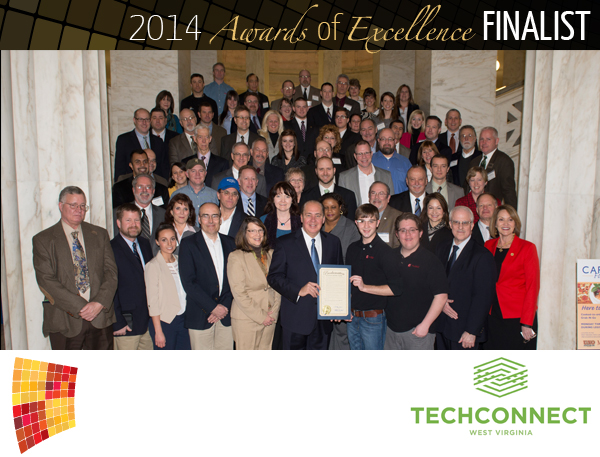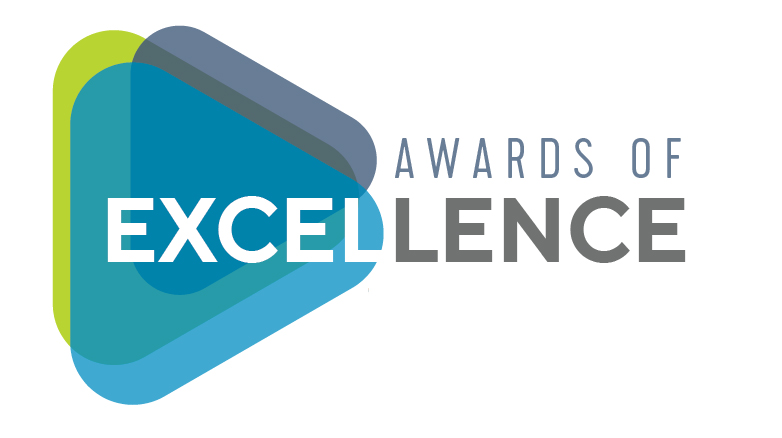Network

| Award Category: | Leadership and Collaboration |
| Project Site: | TechConnect West Virginia |
| Submitted By: | TechConnect West Virginia |
| Contact: | Anne Barth , 304.444.2918 |
Case Study
Abstract
TechConnect is a statewide economic development organization working to catalyze technology-based economic development by bringing together industry, higher education, public and private research, and the public sector. By facilitating diverse stakeholders who support this collaborative initiative, TechConnect offers a unique model for rural states to overcome the challenges of technology-based economic development and build on inherent “small place” advantages. TechConnect understands the future will not look like the past, and is working to move West Virginia toward a more diverse, robust economy that is competitive in a global, knowledge-based marketplace.
TechConnect is organized around the premise that in order to compete in the 21st century economy, economic diversification is mandatory. More specifically, this diversification must be based on intellectual capital gained through research and development. Founded in 2006 with support from the Claude Worthington Benedum Foundation, TechConnect secured backing from the U.S. Economic Development Administration and the State of West Virginia in 2011, allowing the launch of new, capacity-building programs and initiatives. With efforts focused on additive manufacturing and four targeted technology sectors, TechConnect strives to create the right environment for the seeds of innovation to grow into thriving commercial enterprises.
Since its inception, TechConnect has led the charge for innovation-based economic development in West Virginia by cultivating 162 partners, providing services and networking to 109 companies, working with 13 colleges and universities, participating in 10 business competitions, creating 7 statewide programs, and helping to launch the nation’s only chemistry-based business incubator.
Problem/Background
As a leading energy-producing state, West Virginia has contributed to the nation’s domestic energy needs and energy security for more than a century. Throughout its 150-year history, the state’s economy has been built on an abundance of natural resources: coal, oil, gas, and timber. In addition, manufacturing provided thousands of jobs in the chemical, steel, aluminum, and glass industries through much of the 20th century. Mechanization in the mining industry and the offshoring of manufacturing jobs beginning in the 1980s resulted in the loss of thousands of good-paying jobs, and contributed to a steady “brain drain” as young people left the state in droves. By 2000, it became clear that economic diversification was the solution to creating jobs, retaining and attracting talent, and stabilizing state revenues.
Economic diversification remains an elusive goal for West Virginia and much of rural America, as wealth and capital are concentrated along the coasts. To overcome the obstacles and more fully engage in the new knowledge economy, West Virginia first had to create the capacity to collaborate. While energy production does–and will–remain an integral part of the state’s economy for years to come, the founders of TechConnect realized that the majority of new jobs in the 21st century will be knowledge-based, and that long-term job creation would be enhanced by capitalizing on talent at universities, in laboratories, on the shop floor, and in garages.
In 2005, economic development experts from West Virginia University (WVU) and Marshall University began a conversation with commercialization leaders and foundation representatives to initiate plans for the formation of what later became TechConnect. This core group reached out to state leadership to expand the discussion of a collaborative economic development strategy that could address the challenge of creating high-wage jobs in fast-growing industries.
In addition to the intellectual capital at both WVU and Marshall University, West Virginia is home to the National Energy Technology Laboratory, the FBI’s Criminal Justice Information Services Division, the National Oceanic and Atmospheric Administration, the National Institute for Occupational Safety and Health, the National Radio Astronomy Observatory, the National White Collar Crime Center, the Defense Forensics and Biometrics Agency, and other federal labs and agencies. These facilities present an excellent opportunity for the state to capitalize on existing intellectual capital while growing new jobs.
TechConnect’s role is to connect key players in the innovation network and build support and collaboration for a shared strategy for technology-based economic development. Primary goals are 1) to increase the culture of entrepreneurship in the state; 2) grow technology clusters, 3) ensure access to capital at all stages of development; and 4) promote incentives that will grow, attract, and retain technology companies.
Solution
With the creation and launch of TechConnect, West Virginia now has one of the most evolutionary approaches to address technology-based economic development. The model is designed specifically for rural areas and has demonstrated that the power of collaboration can be leveraged to create new jobs by building trusting relationships, identifying a shared vision, and adopting the concept of enlightened self-interest.
To establish TechConnect, it was imperative to engage high-level leaders from the state’s two research universities at the outset. From this base, TechConnect added commercialization expertise to its team, including: private sector partners such as legal and accounting service providers; the State Department of Commerce; the State’s venture capital fund; federal and private laboratories; centers of excellence such as Marshall University’s Robert C. Byrd Institute for Advanced Flexible Manufacturing; industry organizations; and private technology firms.
When necessary partners did not exist, TechConnect created them. Two cases in point are the West Virginia Angel Investor Network and the Biosciences Association of West Virginia. The level of commensurate activity has increased both within and between these entities, further strengthening the innovation ecosystem.
To maximize every opportunity, small states must capitalize on each of their possible advantages and in West Virginia that list includes:
- Most of the stakeholders know each other;
- The ladder to reach top, decision-making officials, including the Governor, is short and direct;
- There is a low cost of doing business;
- High quality of life is a selling point to Millennials and Boomers alike; and
- West Virginia’s geographical location puts it within 500 miles of more than half of the U.S. population.
TechConnect factors these “small place” advantages into its strategic operations to accelerate growth and development. Strengthening the bonds of trust between partners occurs through shared goals and regular communication, which contributes to effective collaboration. In West Virginia, TechConnect’s innovative approach ensures sustained collaboration by creating a dynamic team to implement growth strategies. The initial goal of overcoming traditional boundaries is actually an ongoing goal; keeping all of the players actively engaged calls for board members who remain committed to the ultimate goal of economic diversification. TechConnect achieves this through continuous and high-value engagement that reinforces the concept of enlightened self-interest for each stakeholder.
After TechConnect was established, it partnered with the Battelle Technology Partnership Practice to create the West Virginia Blueprint for Technology-Based Economic Development. Following the strategies and actions outlined in the Blueprint, TechConnect has connected the stakeholders, aligned and leveraged existing assets, and launched both new programs and new organizations to capitalize on growth opportunities.
In 2013, TechConnect added additive manufacturing as a targeted key growth area, in response to the growing number of jobs being reshored by American manufacturers, and in preparation for downstream manufacturing opportunities afforded by the unprecedented natural gas production from regional shale plays. Subsequently, TechConnect launched the Innovation Adoption Program to help small manufacturers incorporate growth strategies based on innovation using the technical expertise of the state’s “centers of excellence.”
TechConnect uses social media, email platforms, and earned media to market, raise awareness, and celebrate accomplishments of all constituents in the state’s innovation ecosystem. By increasing the visibility of the work already underway, TechConnect has been instrumental in demonstrating that the innovation economy is not just a concept, but a real and tangible engine for growth and job creation. As awareness grows, TechConnect hopes and expects to see a more concerted effort on the part of both the state and private partners.
Results
Since its inception, TechConnect has led the charge for innovation-based economic development in West Virginia by creating seven new statewide programs, cultivating 162 partners in a statewide innovation coalition, helping to launch the nation’s only chemistry-based business incubator, and providing 146 companies with a variety of services ranging from operational assistance, startup financing, prototyping, advanced manufacturing expertise, and more.
Early success in overcoming traditional barriers of silos was key to the group’s success and hinged upon engaging CEOs and presidents within the stakeholder organizations. Together, this team began to graft a more entrepreneurial spirit into the people, programs, and key organizations of West Virginia.
By connecting the resources needed for innovation to be converted into enterprise, TechConnect has accelerated the transformation of ideas into reality. Furthermore, strategic relationships already existed, but they had to be intentionally nurtured to build the trust needed for effective collaboration. TechConnect offered the platform for this to happen, through regularly convening meetings, programs, and activities around the state.
TechConnect partnered with the Battelle Technology Partnership Practice to produce the West Virginia Blueprint for Technology-Based Economic Development, an in-depth guide for creating high-wage jobs in fast-growing industries. The Blueprint identified four areas of concern to be addressed:
- Build a culture that supports innovation and entrepreneurship;
- Grow West Virginia’s prime technology clusters– advanced energy; chemicals and advanced materials; biotechnology; and biometrics and identity management;
- Ensure access to capital at all stages of development; and
- Promote a pro-active business climate with incentives that will grow, attract, and retain technology businesses.
These four over-arching goals create a foundation for TechConnect’s role in changing West Virginia’s economic future.
TechConnect established programs to accelerate growth in technology sectors and showcase success, including: StartUp West Virginia Manufacturing; StartUp West Virginia Venture commercialization assistance; the Innovation Transfer Consortium geared toward smaller institutions of higher education (primarily undergraduate); the Innovation Adoption Program for small manufacturers; the statewide Spirit of Innovation Awards; the annual Innovation & Entrepreneurship Day at the State Capitol; and a biennial conference highlighting Women and Technology.
TechConnect launched the Bioscience Association of West Virginia to lead implementation of strategies in the bioscience sector. In addition, TechConnect worked with partner organizations to establish ChemCeption, the only business incubator in the nation focused solely on commercializing chemistry-based technology, which represents another step in developing the human capital long associated with the region’s extensive chemical industry.
TechConnect also worked with partner organizations to launch the Chemicals and Advanced Materials Commercialization Fund; support the TransTech Energy Business Development Conference, now in its third year; and sponsor the annual West Virginia Biosciences Summit, first launched in 2011.
Through conferences, events, and special forums, TechConnect has engaged more than 2,800 individuals in the past three years. In addition, programs have been initiated with thirteen colleges and universities, and TechConnect has supported and/or participated in ten business plan competitions.
Through its efforts to provide a forum for collaboration, TechConnect provided a foundation for the launch of the $13.1 million West Virginia Capital Access Program (WVCAP), second in the nation in deploying funds through the State Small Business Credit Initiative.
Of these quantitative impacts, WVCAP stands out as a singular success story. Because the network to deploy this program had been constructed with TechConnect’s help when the opportunity was announced by the U.S. Treasury, West Virginia was able to deploy its funding at the second fastest rate in the nation. Overall, WVCAP has created and or retained nearly 1,000 jobs and leveraged more than $62 million in private investment in almost 60 transactions. With a 10-to-1 leverage in private funding for every dollar of federal support by the program’s end, West Virginia’s $13.1 million allocation is expected to result in $130 million in new investment over the course of the five-year initiative.
On the qualitative side of impacts realized, TechConnect provided the State of West Virginia with a formal partner to engage in technology-based economic development. This, in turn, generated new partnerships among service providers as well as new business, technical, and financial support for West Virginia companies. TechConnect also brought the issue of technology-based economic development to the attention of West Virginia’s elected officials through annual presentations and meetings. As a result, TechConnect is recognized as the frontrunner organization for technology-based economic development throughout the state.
As is the case for many small organizations, TechConnect wears many hats. Primarily, TechConnect serves as a facilitator. By coordinating opportunities for leaders across diverse sectors to convene and communicate, TechConnect connects the dots that lead to fruitful, mutually beneficial partnerships and collaborations. However, facilitating interactions and building relationships is only the tip of the iceberg. TechConnect is a recruiter, a policy advocate, and a cheerleader. TechConnect is a program manager, a grant writer, and even a communications and public relations specialist. Each role and its respective responsibilities are critical to the organization’s success; such success would not be possible without the ongoing support, input, and engagement of the diverse stakeholders.
Future Considerations
TechConnect’s challenge is to sustain not only funding, but also the energy and drive that motivates a group to move forward and grow. Just as current and future jobs are and will constantly evolve, so will TechConnect work to sustain its underlying mission to promote and develop West Virginia’s economy, while adapting to the ever-changing needs in the marketplace. To this end, TechConnect must continue to address three major sustainability components:
- Resource building between the partners – What is good for one is good for all, and both communal and individual successes contribute to a virtuous circle of growth. TechConnect gains in strength as each partner grows stronger.
- Diversified funding stream – TechConnect’s financial model consists of a blend of public and private funds to create a diversified funding stream that is resilient in the face of changing budget conditions.
- Passion, persistence, and unity –TechConnect has been outspent by its neighboring states by hundreds of millions of dollars, but has still managed to build and support an innovation ecosystem, as well as create programs that contribute to economic growth. TechConnect must continue to lead with passion, persistence, and unity of purpose.
TechConnect’s model is both replicable and scalable, and of particular benefit to a smaller, more rural state or region. The step-by-step process includes:
- Engage – Recruit high-level leaders from an area’s college or university and the leading economic development entity.
- Expand – Broaden the conversation to include commercialization specialists, private industry, and entrepreneurial and small business development resources.
- Research – Determine strengths and best practices.
- Identify – Based on the research, develop a shared vision and articulate short- and long-term goals.
- Connect – Bring the stakeholders together.
- Fund – Secure resources to deploy programs and activities.
Each of these steps address a critical element of developing an effective leadership team focused on improving statewide economic development. In fact, such practices would apply to creating an effective team no matter the mission. The specifics and content for each step may vary, depending on the resources, capabilities, and advantages available to the community, organization, or cohort of organizations. TechConnect believes that these best practices can be implemented and adjusted in such a way to benefit all stakeholders involved, and make it possible to reach the end goal of promoting and building a region’s economic future.

